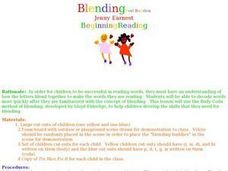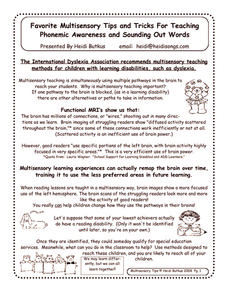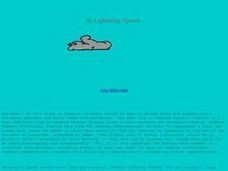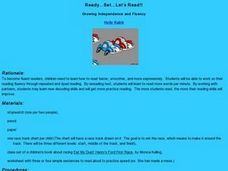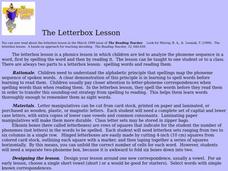Curated OER
Decoding Strategies
Young scholars practice using context clues to decode the meanings of unfamiliar words. In this vocabulary skills lesson, students follow the provided instructions to complete graphic organizers that enable them to decode words in Lewis...
Curated OER
Quick and Sticky Context Clues
Discuss strategies for defining word your young readers don't know. They read sentences with key words covered by sticky notes and guess from the context what the word might be. They peek at the first letter and guess again.
Alabama Learning Exchange
Phonics lesson for -ew and -oo
First graders identify letters and sounds associated with -ew and -oo sounds. Each learner receives a stack of cards containing these sounds, and they must determine whether the word uses the -ew or the -oo sound. This could easily...
Curated OER
Blending Best Buddies
Practice blending letters together to make the words learners are reading. They decode words familiarized with the concept of blending. This lesson utilizes the Body-Coda method of blending developed by Lloyd Eldredge. Each child...
Meadows Center for Preventing Educational Risk, University of Texas at Austin
Lesson 17 - Adding Suffixes That Change Base Words' Finally to I
If it ends in a y, change the y to i when adding a suffix like -ness, -ly, or fy. The final lesson in the Word Recognition and Fluency series of 17 explains when to change the final letter in a base word to i before adding a suffix....
Curated OER
Alphabet Poems
Develop fluency with a variety of works. Help kindergartners use multiple strategies to understand text and decoding. They will create an alphabet poem book on Kid Works 2 to illustrate and write their own poem. In the end, they will...
Curated OER
Word Origins
Understanding a word's etymology can really help with decoding and building vocabulary skills. Readers compare and contrast words of similar origins but with different difficulty levels. They focus on prefixes, suffixes, and affixes....
Meadows Center for Preventing Educational Risk, University of Texas at Austin
Lesson 9 - Contractions
Is it do'nt or don't? How about doesn't or does'nt? A instructional activity on contractions helps learners identify, form, and use contractions. Components within the plan include direct instruction on decoding and encoding...
PBS
Decoding Media Bias
Alternative facts? After watching the We The Voters film, "MediOcracy," viewers compare how cable news outlets CNN, Fox News, and MSNBC report the same story about politics or public policy. After a whole-class discussion of their...
Curated OER
Phonemic Awareness and Sounding Out Words
Although designed for children with learning disabilities, such as dyslexia, the multi-sensory tips and tricks included in this illustrated eight-page packet are designed to develop phonemic awareness and are appropriate for any classroom.
Curated OER
At Lightning Speed
Review how to decode words and practice repeated readings for fluency. Kids review the cover-up method as a way to decode unknown words and then practice reading sentences for fluency and short passages with partners. They record their...
Curated OER
Using Picture Cues to Read Unknown Words
Help readers identify new words. Learners will use illustrations in the story From Head to Toe by Eric Carle to help them with unknown words. As they read new vocabulary words, they will use pictures on the imbedded worksheet to discover...
Curated OER
Rhyming Words: The Ut Family
What a great resource! Learners can review words with short vowel sounds, such as bun, bus, and hut using this presentation. The slides are easy to understand and colorful. This would be a quick way to review these words either in a...
Curated OER
Syllables
Review important reading skills with this resource on syllables. Learners discuss the rules for dividing words into syllables, and they practice this skill with a variety of words. This is a comprehensive and useful presentation to use...
Curated OER
New Words: Make a Conservation Dictionary
Gosh dictionaries are great, and your class gets to make one of their own. They look up and write down the dictionary definition to nine words related to conservation and pollution prevention. They list their words alphabetically for...
Curated OER
Reading Comprehension: David Copperfield
Good worksheets are hard to find, but you found one! Your class reads an excerpt from the classic, David Copperfield. They answer four comprehension questions and explore context to complete eight fill-in-the-blank vocabulary words. The...
Curated OER
Using a Dictionary: Root Words
A dictionary is a very helpful tool. Teach your third graders how to locate words, define them, and understand what root words are. They look up 12 words, write their definitions, then determine the root word that helps categorize each...
Great Schools
Different Types of Writing
What type of writing is this? Learners read a brief introduction to various types of text: instructions, explanations, poems, folk tales, novels, informative, and arguments. The introduction doesn't explain these, so consider going over...
Curated OER
Silent W
Spelling can be hard enough without silent letters. Help your third graders decode nine words that have the silent letter W, such as wrinkle or wrong. Once they decipher all nine words, they use each in a new sentence. The bottom of the...
Curated OER
Ready...Set...Let's Read!!
Students observe and demonstrate various reading decoding strategies to improve their reading fluency. In pairs, they take turns reading sentences outloud to each other, with the goal of reading them more quickly each time. Students...
Curated OER
You can call me.........Speedy Gonzalez!
Students practice their decoding skills to increase reading fluency. They use timed reading to observe the rate at which they read. They work in small groups to read a book in a time situation.
Curated OER
The Letterbox Lesson
Pupils analyze phoneme sequence in a word. They spell words using phoneme analysis and read new words using phoneme analysis.
Alabama Learning Exchange
Phonics lesson for -ick family
Kindergarteners and first graders develop phonemic awareness for words that contain -ick. Each learner gets a stack of cards with different -ick words, highlighting the target sound as they review each one.
Curated OER
Smart Board Syllable Activity
Learners divide words, using syllable division rules. They divide two and three syllable words. They follow Orton-Gillingham rules and use the first three division rules.
Other popular searches
- Decoding Unfamiliar Words
- Decoding Long Words
- Decoding Multisyllabic Words
- Decoding Accented Words
- Decoding Animal Words
- Decoding Vowel Words
- Decoding Spelling Words
- Decoding Multi Syllable Words
- Decoding Greek Latin Words
- Decoding Big Words
- Decoding Polysyllabic Words
- Decoding Unknown Words





